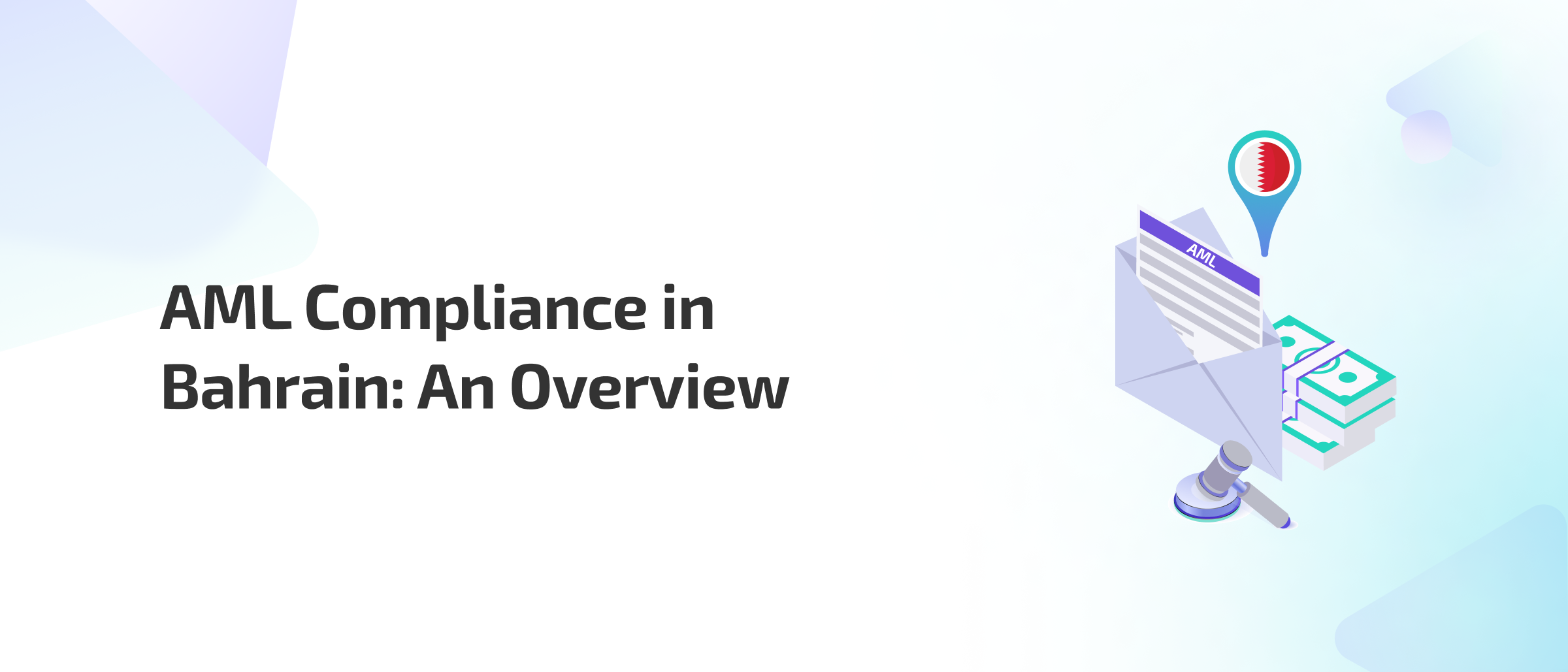.webp)
Published on
July 23, 2025
AML Compliance in Bahrain: Frameworks, Risks, and Reporting
In this story

Accelerate AML Compliance: Meet Regulatory Demands with 80% Less Setup Time
.svg)
.svg)
As one of the most advanced financial centers in the Gulf region, Bahrain plays a key role in regional and international finance. This status brings both opportunity and risk—especially in the context of money laundering and terrorist financing. To address these threats, Bahrain has developed a comprehensive Anti-Money Laundering and Countering the Financing of Terrorism (AML/CFT) framework, aligned with international standards set by the Financial Action Task Force (FATF).
What is Anti-Money Laundering Compliance in Bahrain?
At the core of Bahrain’s AML regime is the Anti-Money Laundering Law (Decree Law No. 4 of 2001), which criminalizes money laundering and provides the legal basis for national AML efforts. This law is enforced and monitored primarily by the Central Bank of Bahrain (CBB) and the Financial Intelligence Directorate (FID), two agencies that are central to Bahrain’s compliance ecosystem.
Bahrain’s financial institutions, including banks, money service providers, insurance firms, and fintech companies, are required to implement strict AML controls. These include:
- Performing Customer Due Diligence (CDD) and ongoing monitoring
- Filing Suspicious Transaction Reports (STRs)
- Applying a risk-based approach to compliance
- Ensuring staff training and internal controls
Major Takeaway:
Bahrain has built a strong, FATF-aligned AML framework to protect its financial system. Understanding and complying with these laws is mandatory for all regulated businesses.
Legal and Regulatory Framework for AML Compliance in Bahrain
Bahrain’s AML compliance is built on a solid legal foundation designed to prevent money laundering and terrorist financing within its financial system. The framework is mainly governed by:
1. Anti-Money Laundering Law (Decree Law No. 4 of 2001)
This law criminalizes money laundering activities and establishes the National Committee for Combating Money Laundering, which coordinates AML efforts across government bodies. It defines offenses, penalties, and the responsibilities of reporting entities. The law has been updated multiple times to align with evolving global AML standards.
2. Central Bank of Bahrain (CBB) Rulebook - Volume 6: AML/CFT Module
The CBB oversees AML compliance for all licensed financial institutions in Bahrain. Volume 6 of the CBB Rulebook details the AML/CFT requirements, including obligations for customer due diligence, record keeping, suspicious transaction reporting, and internal controls. It also mandates periodic AML training for staff and compliance officers.
3. Financial Intelligence Directorate (FID)
The FID acts as Bahrain’s Financial Intelligence Unit (FIU), receiving and analyzing Suspicious Transaction Reports (STRs). It plays a critical role in identifying and investigating potential money laundering and terrorism financing activities and works closely with law enforcement agencies
4. The Ministry of Industry and Commerce (MOIC)
The Ministry of Industry and Commerce (MOIC) coordinates the efforts of various government agencies to implement Bahrain’s AML strategy, conduct national risk assessments, and engage in international cooperation.
5. International Compliance and Cooperation
Bahrain is a member of the Middle East and North Africa Financial Action Task Force (MENAFATF), the regional FATF-style body. The country regularly undergoes mutual evaluations to ensure its AML framework meets international standards, strengthening its global financial reputation.
Major Takeaway:
Bahrain’s AML compliance rests on a clear, updated legal framework supported by regulatory authorities like the CBB and FID, ensuring institutions meet global AML standards.
Comply quickly with local/global regulations with 80% less setup time
.svg)
.svg)
Key Elements of AML Compliance in Bahrain
To effectively combat money laundering and terrorist financing, financial institutions and designated non-financial businesses in Bahrain must follow several core AML compliance elements. These are detailed in the CBB Rulebook and related regulations.
1. Customer Due Diligence (CDD) and Know Your Customer (KYC)
Bahraini institutions must verify the identity of customers before establishing business relationships. This includes collecting official documents, verifying the source of funds, and continuously monitoring transactions for suspicious activities. Enhanced due diligence is required for high-risk customers, such as politically exposed persons (PEPs) or clients from high-risk jurisdictions.
Read more: Politically Exposed Persons in the UAE and AML Compliance
2. Risk-Based Approach (RBA)
Institutions must assess and understand the risks related to money laundering and terrorist financing specific to their business activities. They then apply proportional controls and resources based on the level of risk identified. This ensures efforts are focused where the threat is greatest.
Read more: Risk Assessment in Kuwait: Compliance Risks and Best Practices
3. Record-Keeping and Reporting
Businesses must maintain detailed records of customer identification and transaction data for at least five years. Any suspicious transactions must be promptly reported to Bahrain’s Financial Intelligence Directorate (FID) via Suspicious Transaction Reports (STRs). Failure to report can lead to penalties.
Read more: Anti-Money Laundering in Jordan: An Overview of Laws & Penalties
4. Internal Controls and Governance
Institutions are required to establish strong internal AML policies and procedures. This includes appointing dedicated compliance officers, performing regular staff training, conducting internal audits, and implementing transaction monitoring systems that flag unusual or suspicious activities.
Read more: Anti-Money Laundering in Egypt: Compliance and AML Laws
5. Staff Training and Awareness
Regular AML/CFT training must be provided to all employees, especially those in front-line and compliance roles. This helps staff recognize red flags and understand reporting obligations.
Read more: Anti-Money Laundering in Iraq: Regulations, Best Practices
6. Collaboration and Enforcement
The CBB and FID collaborate with other national and international bodies to investigate and enforce AML laws. This cooperation enhances the ability to detect and prevent financial crimes effectively.
Major Takeaway:
Bahrain’s AML framework mandates a detailed and risk-focused compliance program with strict customer verification, record-keeping, reporting, and staff training, backed by strong governance.
7 Practical Steps for AML Compliance in Bahrain
Implementing AML compliance effectively requires practical measures that financial institutions and regulated entities can adopt. Below are key steps to ensure alignment with Bahrain’s AML regulations:
1. Register and Maintain Accurate Records: Businesses engaged in financial activities must register with the relevant authorities and maintain accurate records of customer identity and transactions for a minimum of five years.
2. Conduct Comprehensive Customer Due Diligence (CDD): Before onboarding clients, verify identities using official documents, assess the risk profile, and understand the customer’s business and source of funds. Maintain ongoing monitoring to detect any suspicious changes in behavior or transactions.
3. Implement a Risk-Based Approach (RBA): Assess risks related to customer types, geographic locations, products, and services offered. Tailor AML controls proportionally, higher-risk customers require enhanced scrutiny and monitoring.
4. Establish Robust Internal Policies and Controls: Develop clear AML policies, assign responsibilities, and use automated monitoring tools like FOCAL AML Compliance solution to flag suspicious transactions. Ensure regular internal audits to verify compliance effectiveness.
5. Train Employees Regularly: Provide AML training tailored to different employee roles, focusing on recognizing red flags, reporting requirements, and understanding AML laws. Refresh training periodically to stay current with regulatory changes.
6. Report Suspicious Transactions Promptly: File Suspicious Transaction Reports (STRs) with the Financial Intelligence Directorate (FID) without delay when suspicious activity is identified. Ensure confidentiality and protect whistleblowers.
7. Cooperate with Regulatory and Law Enforcement Agencies: Maintain open communication channels with the CBB, FID, and other authorities. Participate in audits and investigations transparently.
Major Takeaway:
Effective AML compliance in Bahrain requires proactive registration, thorough due diligence, risk-based controls, staff training, timely reporting, and cooperation with regulators.
Penalties and Enforcement Measures under Bahrain’s AML Law
Bahrain applies strict sanctions for money laundering to deter financial crime and ensure accountability at both individual and institutional levels.
1. Individual Offenders: Severe Criminal Sanctions
Individuals found guilty of committing or attempting to commit money laundering face serious consequences. These include prison terms of up to seven years and fines that can reach BHD 1 million. Harsher sentencing, starting from a minimum of five years imprisonment and BHD 100,000 in fines, applies when aggravating factors are present, such as:
- Involvement in organized criminal groups;
- Abuse of power or position within an institution;
- Attempts to obscure the criminal origin of funds by making them appear legitimate.
These heightened penalties reflect the seriousness of exploiting institutional influence or organized crime links.
2. Asset Confiscation and Recovery
In addition to custodial sentences and fines, courts may order the seizure of assets linked to the crime. This includes property directly involved in money laundering or assets of equivalent value, even if they are held by the offender’s immediate family. If a defendant dies before prosecution is complete, their heirs must prove that the assets were lawfully acquired to avoid confiscation.
3. Corporate Accountability
When money laundering is carried out by a company, it does not shield the organization from liability. Corporations can be fined up to BHD 1 million and also face asset confiscation. Importantly, this does not absolve individuals within the firm from being prosecuted separately.
4. Ancillary Offenses and Lesser Violations
Lesser violations such as non-compliance with AML-related regulations may result in penalties of up to two years' imprisonment or fines of up to BHD 50,000. Breaches of ministerial directives and regulatory guidelines can lead to three months in prison or fines not exceeding BHD 20,000.
Major Takeaway:
Bahrain enforces strict penalties for money laundering, including imprisonment, substantial fines, asset confiscation, and corporate liability. However, the law also encourages self-reporting by offering potential immunity or leniency for voluntary disclosures.
How do financial institutions submit a Suspicious Transaction Report (STR) in Bahrain?
Financial institutions in Bahrain follow a structured, electronic process overseen by the Central Bank of Bahrain (CBB) and the Financial Intelligence Directorate (FID).
Here’s how it works:
1. Internal Identification & Reporting:
- Employees must report any unusual or suspicious activity to the Money Laundering Reporting Officer (MLRO) without delay.
- The MLRO reviews the information, if suspicion persists, the MLRO initiates a formal STR.
2. Use the CBB/FID Online STR System:
All STRs must be submitted electronically via the Online STR System, paper forms are not accepted.
- Reports are sent simultaneously to:
- Financial Intelligence Directorate (FID), Ministry of Interior
- Compliance Directorate, Central Bank of Bahrain
3. No Prior Approval Required: The MLRO can submit STRs independently; no further sign-off should delay the filing.
4. Confidentiality and Tipping‑Off Prohibited: The institution must not alert the client or any third party involved, this is considered “tipping‑off” and is prohibited.
5. Record-Keeping of STRs: Institutions are required to retain all STR submissions and supporting documentation for at least five years.
Achieve AML Compliance Easily in MENA Using FOCAL
FOCAL helps businesses in the MENA region meet Anti-Money Laundering (AML) requirements with easy-to-use and reliable tools. Its AML Compliance Solution covers all key areas, including transaction monitoring to detect suspicious activity, case management to investigate alerts, and customer due diligence to verify and assess customer risk. These tools work together to help companies stay compliant with AML regulations in a simple, efficient, and effective way.
FAQs
Q1. Is Bahrain a FATF Member?
Yes, Bahrain is a full member of the Financial Action Task Force (FATF), through its inclusion as part of the Gulf Cooperation Council (GCC), and is an active member of MENAFATF.
Q2. Which financial institutions are subject to AML requirements in Bahrain?
All financial institutions regulated by the CBB, including banks, investment firms, insurance companies, money exchange businesses, and financial intermediaries, must comply with AML laws. This also extends to Designated Non-Financial Businesses and Professions (DNFBPs) such as real estate agents, lawyers, and accountants where relevant.
Q3. What is the role of AML Compliance Officers (AMLCOs) in Bahrain?
AMLCOs are responsible for implementing AML policies, overseeing CDD, monitoring transactions for suspicious activity, ensuring timely filing of Suspicious Transaction Reports (STRs), training staff, and liaising with the Bahrain Financial Intelligence Unit (FIU). They must ensure their institution adheres to CBB regulations and international AML standards.
Q4. How is money laundering characterized under the Bahraini law?
According to Article 2 of the law, money laundering encompasses any action involving the handling of criminal proceeds, including concealing them. Criminal proceeds are defined as assets obtained, either directly or indirectly, wholly or partially, from illegal activities committed either inside Bahrain or internationally. These assets may be tangible or intangible, movable or immovable.
Q5. What degree of awareness or intent is required to prove a money laundering offense in Bahrain?
To be found guilty of money laundering, the individual must have known or reasonably suspected that they were dealing with or concealing illicitly obtained assets or failing to disclose them.
Streamline Compliance: Achieve 80% Faster Setup for Fraud Prevention
.svg)
.svg)

How Aseel reduced onboarding time by more than 87% using FOCAL
Learn how FOCAL empowered Aseel to achieve new milestones.
.svg)
.svg)
Mastering Fraud Prevention: A Comprehensive Guide for KSA and MENA Businesses
51% of organizations fell victim to fraud in the last two years, don't be caught off guard, act proactively.
.svg)
.svg)
Featured blog posts
.svg)
AI-Driven Precision in Fraud Risk and AML Compliance
.svg)
.svg)

.svg)
.png)






.webp)




.svg)

_FastestImplementation_Small-Business_GoLiveTime.png)

_HighPerformer_Small-Business_HighPerformer.png)
_Leader_Leader.png)



%20(1).webp)